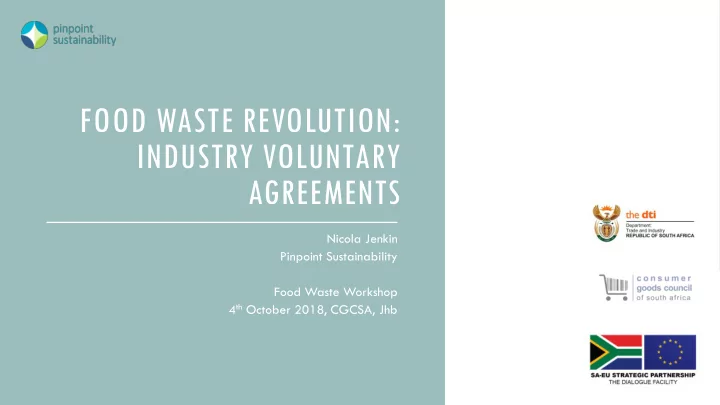

FOOD WASTE REVOLUTION: INDUSTRY VOLUNTARY AGREEMENTS Nicola Jenkin Pinpoint Sustainability Food Waste Workshop 4 th October 2018, CGCSA, Jhb
INTRODUCTION TO SA-EU DIALOGUE RESEARCH: REDUCTION AND PREVENTION OF FOOD WASTE IN SOUTH AFRICA GOAL: To help South African consumer goods companies contribute to and benefit from healthy sustainable ecosystems in Africa while reducing food insecurity and assisting government to achieve the SDG 12.3 goals KEY OBJECTIVE: … to make an informed judgement regarding the road map for the reduction and prevention of food waste methodologies in South Africa. SERVICES: 1. Documented gap analysis report to inform the current status of food waste in South Africa in order to set food waste reduction target goals; 2. Participate in a multi-stakeholder workshop in Johannesburg, South Africa; 3. Make recommendations to the development of the voluntary agreements for food waste reduction and prevention in South Africa.
DISCUSSION: ACTIVITY 3: SETTING AMBITIOUS YET REALIST TARGETS AGAINST A ROADMAP 2030 SDG 12.3: 50% food waste reduction by 2030 12 years to halve SA’s food waste 5 million tonnes Sub-targets e.g: 2025 2025: X% food waste reduced by 2025 Sub-targets e.g: 2019 2019: Q1 SA food waste roadmap / VA 2019: Q3 X targeted signatories signed 2018
Champions 12.3 (Global) Coalition of executives from government, businesses, international organisations, research institutions − and civil society dedicated to mobilising action to accelerate progress towards achieving SDG 12.3 Leverage body: World Resources Institute − Consumer Goods Forum (CGF) Resolution (Global) Membership aims to halve food wasted within operations of retailer and manufacturer members by − 2025; collaborate with Champions 12.3 Leverage body: Consumer Goods Forum − Courtauld Commitment 2025 (UK) Collaborative action to cut the resources need to provide food and drink in the UK (producer to − consumer); and cut costs – to help achieve the SDG 12.3 by 2030 Leverage body: WRAP [DEFRA] − Food Loss and Waste 2030 Champions (US) Twenty major U.S. food businesses have committed to halve FLW within operations by 2030. − Leverage bodies: USDA and EPA − National Food Waste Strategy (Australia) Consultative framework to support actions that can help work towards halving Australia’s food − waste by 2030 Leverage body: Dept. Environment and Energy − Refresh: Voluntary Agreements as a policy instrument for food waste reduction (EU) Objective of reducing food waste, to be in line with SDG Goal 12.3 of halving food waste by − 2030. Development of a voluntary agreement ‘blueprint’ − Leverage body: European Commission −
DISCUSSION: ACTIVITY 1 Share your food waste reduction activities and ambitions
DISCUSSION 2A: PROPOSED VOLUNTARY AGREEMENT FOCUS AREAS Supply chain focus • Where should we focus the South African agreement from a supply chain perspective? • Should it include hospitality and food service? • What is feasible/practical? • Where do we have the most robust data? • How should we determine the supply chain focus e.g. by mass (tonnes); financial (ZAR); nutritional value; other environmental impacts (e.g. water consumption) Sources: Oelofse and Nahman, 2013; WWF-SA, 2017
DISCUSSION 2B: PROPOSED VOLUNTARY AGREEMENT FOCUS AREAS Food group focus • Where should we focus the South African agreement with regards to food-type? • What is feasible/practical? • Where do we have the most robust data? Source: Oelofse and Nahman, 2013
DISCUSSION 2C: PROPOSED VOLUNTARY AGREEMENT FOCUS AREAS Unique SA areas of focus • How do we take into account SA’s diversity in demographics and access to services? • How do we acknowledge issues of hunger and poor nutrition e.g. donations? • Should we recognise the implications associated with food packaging (pro’s and con’s)? Sources: SANHANES 2012, Nahman 2011
DISCUSSION 3: VOLUNTARY AGREEMENT CONSIDERATIONS 1. Governance, co-ordination and collaboration (government, industry/business, academia & research institutions; civil society (consumers, NGOs) 2. Setting ambitious yet realist targets and indicators 3. Types of solutions and activities 4. Support (resources, financial etc) 5. Data capture and reporting (level of detail, mechanism, confidentiality, when) 6. Data analysis and reporting (who, aggregation) 7. Data validation
DISCUSSION 4: SETTING AMBITIOUS YET REALIST TARGETS AGAINST A ROADMAP 2030 SDG 12.3: 50% food waste reduction by 2030 12 years to halve SA’s food waste 5 million tonnes Sub-targets e.g: 2025 2025: X% food waste reduced by 2025 Sub-targets e.g: 2019 2019: Q1 SA food waste roadmap / VA 2019: Q3 X targeted signatories signed 2018
THANK YOU! Nicola Jenkin +(0)71 3173625 nicola@pinpointsustainability.co.za www.pinpointsustainability.co.za
Recommend
More recommend